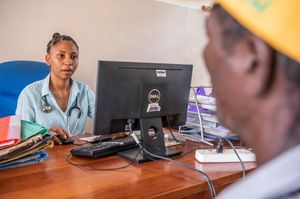Chronic Disease Clinic of Ifakara

The Chronic Disease Clinic in Ifakara (CDCI) is an integral part of the St. Francis Referral Hospital (SFRH) in Ifakara, Tanzania. Since 2005, the CDCI has been delivering HIV care to patients in the large rural catchment area of the Kilombero, Ulanga and Maliyni districts in accordance with national guidelines. Initially established to support the Tanzanian National AIDS Control Programme at the peak of the HIV pandemic, CDCI'S activities have been progressively expanded to provide care for all outpatients and inpatients with HIV, including pregnant and non-pregnant adults, HIV-exposed and HIV-infected children. Care for tuberculosis and, increasingly, non-communicable HIV comorbidities has been integrated. The early introduction of state-of-the-art laboratory testing in this remote setting, such as viral load and resistance testing, is pioneering in Tanzania.
The CDCI is a model clinic for HIV care in rural Africa. It is the result of a successful collaboration between Swiss and Tanzanian institutions. These are the Swiss Tropical and Public Health Institute (Swiss TPH), the University Hospital of Basel, the Ifakara Health Institute (IHI) and the St. Francis Referral Hospital (SFRH). Since its inception, CDCI has enrolled more than 12,000 HIV-positive people into care, implemented a hospital-wide testing strategy for all patients in the SFRH catchment area, and established the Kilombero and Ulanga Antiretroviral Cohort (KIULARCO) to address important research questions. Clinical services of the highest standard, the establishment and maintenance of a patient cohort from the outset, and a growing body of clinical research addressing the clinically relevant questions and interventions, together with the continuous training of medical staff have synergistically strengthened this clinical implementation platform.
In addition to clinical services, the CDCI has integrated research and training. KIULARCO, which has enrolled more than 11,000 people living with HIV since its inception in 2005, is designed to improve care by identifying treatment outcomes and medical needs of a rural population affected by HIV. Numerous peer-reviewed publications reflect the knowledge and impact achieved, which has informed key stakeholders, policy makers and the scientific community at an international level (publication list). CDCI is increasingly involved in clinical trials with multiple international collaborations, which further strengthens the scientific output.

Starting Treatment Immediately
According to the "test and treat" strategy, patients are started on treatment on the same day as their HIV diagnosis, unless signs and symptoms indicate complications that require prior management. A professional counselling team supports patients from the first contact with information, and in coping with the diagnosis, associated stigma and medication programmes. Group sessions with HIV-positive lay counsellors are offered to patients to address the challenges of living with HIV.
Quality Care
A dedicated team of doctors, nurses and counsellors provide differentiated care with task shifting and extended drug refills for stable patients. Patients in care achieve high virological suppression rates of 92% (Ntamatungiro A, 2017). Patients with special needs or medical complications, often referred from other health centers, are offered a diagnostic work-up by a team of medical doctors in close collaboration with the SFRH and the Heart and Lung Disease Clinic. Patients are cared for during hospitalisation and on an out-patient basis for diagnosis and treatment of HIV-associated diseases, AIDS-defining illnesses or non-communicable co-morbidities. A specialized service (One Stop Clinic) provides treatment and care for families affected by HIV. The management of co-morbidities is integrated into routine care, but is also addressed in clinical trials, e.g. for tuberculosis (eFASH) or arterial hypertension (CoArtHA).


Training and Capacity Building
Daily sessions on patient management, case discussions, journal clubs, state-of-the-art lectures and quality aspects of the database provide on-the-job training for all staff. Learning from attending patients and daily routines is as important as learning how to conduct research activities. All staff are exposed to research through KIULARCO, as well as other new projects and clinical trials. They are learning how to design their own studies, write proposals for grant applications and write the manuscripts. We aim to support collaborators who wish to pursue Master's and PhD programmes or specialisations. In addition, the CDCI is a recognised platform for the training of physicians and students from abroad.


